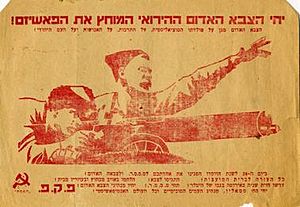Palestine Communist Party facts for kids
Quick facts for kids
|
|
|---|---|
| Founded | 1923 |
| Dissolved | 1948 |
| Merger of | Palestinian Communist Party Communist Party of Palestine |
| Merged into | Maki |
| Ideology | Communism Anti-Zionism |
| Political position | Far-left |
| International affiliation | Communist International |
The Palestine Communist Party (often called PKP) was a political group in the area known as Mandatory Palestine. This was a time when the British ruled the region. The party started in 1923 when two smaller communist groups joined together. In 1924, it became the official Palestinian part of the Communist International, also known as the Comintern. This was a big international group of communist parties. When it first began, most members of the PKP were Jewish. However, the party was against Zionism, which was the idea of creating a Jewish homeland in Palestine.
Contents
History of the Palestine Communist Party
In 1923, the party decided to support the Arab national movement. They saw this movement as standing against British rule. They also said that Zionism was a movement of wealthy Jewish people who were working with the British. This position helped them become part of the Comintern. The party also did not agree with Jewish settlements in Palestine. They also opposed the Histadrut, a Jewish labor organization, and its policies.
Growing Arab Membership
In the mid-1920s, the party started inviting Arab members to join. Karl Radek, a leader in the Comintern, told the PKP that it needed to become a party mainly for Arab workers. He said Jewish people could also be members. British reports say the first Arab joined the party in 1924. By 1925, there were eight Arab members. The party also connected with the Palestine Arab Workers Society. They also made friends with some important Arab families. Many Christian Arabs joined the party because they felt a connection to Russia as they were Orthodox Christians.
At a meeting in Brussels in 1927, representatives from the PKP argued with another group called Poale Zion. The PKP then formed a group against Zionism with Arab nationalists from Palestine, Egypt, and Syria.
Changes and Challenges
Around 1928, the Comintern changed its approach. It told communist parties not to work with national groups that included wealthy people in colonies. This made it harder for the PKP to grow among the Arab population. In 1930, the Comintern changed its mind again. It told the PKP to quickly get more Arab members and leaders.
In December 1930, the PKP tried to win seats in the Jewish Assembly of Representatives in Palestine. They used a hidden group called the Proletarian Party. But they did not win many votes.
During the time of Joseph Stalin in the Soviet Union, many party members faced difficult times. This included people close to the party leader, Leopold Trepper. Daniel Averbach, one of the party's founders, was badly treated. Trepper himself was forced to leave Palestine by the British in 1929. He moved to Europe and later led a spy group during World War II. In 1934, Radwan Al Hilu, a Palestinian Arab, became the party's secretary general. He stayed in this role until 1943.
Party Splits and New Names
In 1943, the party split into two groups. The Arab members formed the National Liberation League in 1944. Both the PKP and the National Liberation League first opposed the 1947 UN Partition Plan. This plan suggested dividing Palestine into Arab and Jewish states. However, they both accepted the plan after the Soviet Union supported it.
In October 1947, the PKP changed its name to MAKEI. This meant the Communist Party of Eretz Israel. This was the first time the communists used the term 'Eretz Israel' (meaning 'Land of Israel') in their party name. However, it was common in Mandatory Palestine to translate 'Palestine' as 'Eretz Israel' when speaking Hebrew. The party still thought the partition was a temporary step towards a state where both groups could live together.
The two parties stayed in touch during the 1948 war. After the war, the National Liberation League joined with Maki. Maki was the new name for the Communist Party of Israel. This happened within the borders of the new state of Israel.
Later Communist Groups
From 1951, the Jordanian Communist Party organized Palestinians in the West Bank. A new Palestinian Communist Organization started in Gaza City. In 1975, a Palestinian Communist Organization was formed in the West Bank. It was a part of the Jordanian party. In 1982, it separated from Jordan and joined with the group in Gaza. Together, they became the new Palestine Communist Party. This party later changed its name to the Palestinian People's Party. In 1987, it joined the Palestine Liberation Organization.
See also
- Communist Party of Palestine
- Da'am Workers Party
- Hadash
- Hagada Hasmalit
- Hebrew Communists, a group that split from the PKP in 1945, rejoined in 1948, and split again in 1949
- Israeli Communist Opposition
- Maariv (newspaper)
- Ma'avak
- Maki (historical political party)
- Maki (political party)
- National Liberation League in Palestine
- Palestinian Communist Party (1922)
- Palestinian Communist Party (formed in 1982)
- Peace Now
- Revolutionary Communist League (Mandatory Palestine)
- Semitic Action
- Socialist Workers Party (Mandatory Palestine)
- Matzpen


